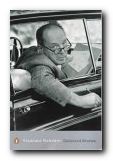a critical examination of Nabokov’s collected stories
‘A Forgotten Poet’ (May 1944) is possibly the weakest of all Nabokov’s short stories – partly because it is a ‘tale’, partly because of a certain improbability in what purports to be a realistic text, and partly because it appears to have no special focus or point. What it does not lack however is good structure.
 The first part of the story presents the little that is known of the life and work of an early nineteenth century poet, Perov. Part two is an account of an evening celebrating his memory held at the turn of the century. To the embarrassment of the organisers an old man appears claiming to be Perov. He asks to be given the takings from a collection, and renounces some of the attitudes for which his early work is being celebrated. The organisers have him taken away by the police. Part three is set following the revolution: a small museum to Perov’s memory is tended by the old man himself, but following his death the museum closes and public interest in him fades away.
The first part of the story presents the little that is known of the life and work of an early nineteenth century poet, Perov. Part two is an account of an evening celebrating his memory held at the turn of the century. To the embarrassment of the organisers an old man appears claiming to be Perov. He asks to be given the takings from a collection, and renounces some of the attitudes for which his early work is being celebrated. The organisers have him taken away by the police. Part three is set following the revolution: a small museum to Perov’s memory is tended by the old man himself, but following his death the museum closes and public interest in him fades away.
It is Nabokov’s speaking as narrator at the end of the story which gives the only clue to the meaning he intended: ‘Somehow or other, in the next twenty years or so, Russia lost all contact with Perov’s poetry. Young Soviet citizens know as little about his works as they do about mine’ (ND,p.47). The story therefore appears to be a plea for retaining cultural consciousness and traditions – as well as offering an amused view of the differences between public perceptions of an artist and the person himself.
Nabokov was well aware from his own experience and that of others, of the damage done to a nation’s cultural heritage by the suppressions, ruptures, and losses sustained during periods of political unrest and tyranny. It is also a critique of those who would use a poet’s work just to support their own views – for the organisers of the disrupted event wish to read into Perov’s works revolutionary sentiments which are not there.
The story also points to the fact that an artist cannot be held even to his own past if he wishes to change. Perov is compared to Rimbaud, who also rejected the role of the poet. He derides his youthful work – ‘a score of frivolous poems’ (p.42) – and since writing it he has been working as a farmer.
But much as one might be sympathetic to such refreshing sentiments, their power as topics is undermined by the very anecdotal nature of the story. As Sean O’Faolain observes, an anecdote might appear to be an attractive germ for a short story, but it is likely in fact to be too simplistic and crude as the basis for a story in its modern form:
‘There is a primitive appeal in narrative or anecdote…but as we develop we want to go a little deeper. A plain or simple record of incident, however heroic or amusing could never satisfy the temper of our day. We have come to expect from the short story much more than a series of incidents, however interesting they may be in themselves’ (SS,p.154)
A further weakness arises from the fictional status of Perov. Nabokov is trying to do something which is very difficult – persuade the reader to accept the idea that a character can have existence both in the fictional world he inhabits and in the ‘real’ world which we and the author inhabit. He can have meaning in one or the other, but not both. We suspend our disbelief only very lightly for a work which pretends to be a historical record. And with good reason – for we can check the record and discover that no such Perov ever existed.
© Roy Johnson 2005
![]() Vladimir Nabokov: The Collected Stories – Amazon UK
Vladimir Nabokov: The Collected Stories – Amazon UK
![]() Vladimir Nabokov: The Collected Stories – Amazon US
Vladimir Nabokov: The Collected Stories – Amazon US
Vladimir Nabokov web links
Vladimir Nabokov greatest works
Vladimir Nabokov criticism
Vladimir Nabokov life and works